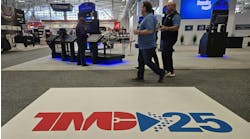When it comes to talking about used equipment, there’s one sentence that strikes terror into the heart of anyone who knows anything about energy efficiency: “I got it on eBay.”
Of course, online auctions can be a good source for finding cheaper alternatives for equipment, but if you’re not careful, that great bargain you found at the auction will have you heading for the hills when it comes time to pay the power bill.
This isn’t limited to an auction house deal. It’s also common practice to inherit used equipment from sister plants and these same dangers apply. If you want to get something used, make sure you are getting the right size. When it comes to compressors, bigger is not always better. A case in point—a manufacturer purchased a 100hp modulating compressor online and was thrilled with the great deal he got. A few years later, his company began making energy upgrades and took a look at the compressor as well.
An energy study for a power utility rebate revealed:
- Available capacity of the 100 hp compressor: 377 cfm
- Peak flow (excluding start up): 61 cfm
- Average flow demand: 10 cfm
- Specific power: 544.45 kW/100 cfm
In other words, the compressor was grossly oversized. After installing a 15hp compressor and a storage tank, the specific power was down to 28.78 kw/100 cfm and he was able to see payback in less than a year.
Oversizing is also a concern with dryers—especially desiccant dryers. They have higher energy costs than refrigerated dryers because they use purge compressed air for regeneration. If they’re oversized, you’ll not only be paying unnecessary electrical costs, you’ll also be losing compressed air you might need for your application. Desiccant dryers also have higher maintenance costs—larger dryers will need larger filters and more desiccant, so you will be spending even more on consumables.
Energy aside, here are some other considerations. With refrigerated dryers, be sure to check and see what kind of refrigerant they use. Older types of refrigerant may not be available or may no longer be EPA compliant.
If you’re looking at buying used equipment for your system, consider checking with the manufacturer to see if there is a service history for that particular unit. This can give you an idea of potential problems as well as let you know if routine maintenance was done.
Buying used equipment isn’t necessarily a bad idea, but be careful. If you’re getting something for a song, you may find yourself singing blues.




